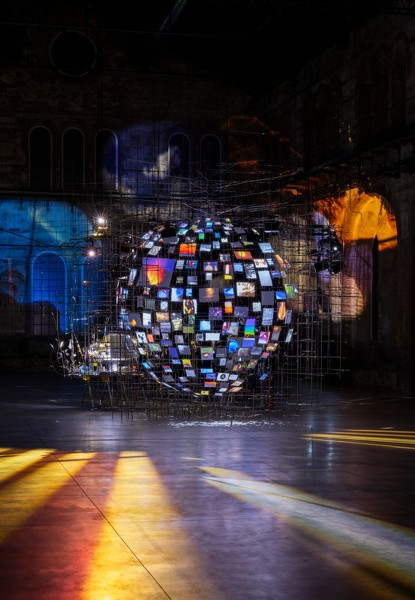from wednesday 30 October 2024 till domenica 2 febbraio 2025
exhibit
OGR Torino | Cyprien Gaillard. Retinal Rivalry | Fino al 2 febbraio 2025
 Art & photography
Art & photography

From October 30, 2024, to February 2, 2025, Platform 1 of the OGR Torino will host "Retinal Rivalry," a solo exhibition by Cyprien Gaillard (Paris, 1980), curated by Samuele Piazza. Gaillard's new video work of the same name, first showcased at the Beyeler Foundation in Basel as part of the group exhibition "Summer Exhibition," will arrive in the city during the Torino Art Week 2024 for its Italian premiere.
Commissioned by OGR Torino and co-produced with Fondation Beyeler, Haus der Kunst Munich, the French Ministry of Culture, Medienboard Berlin-Brandenburg, Sprüth Magers, and Gladstone Gallery, Gaillard's new video work continues his exploration of the potential of stereographic cinema, which began with "Nightlife" (2015).
Through his transgressive cinematic sensibility and animistic logic, "Retinal Rivalry" transforms cinematic images into sculptures designed specifically for the former train workshops of OGR, offering a world infused with the contradictions that negotiate public space. Its title reflects the concept of "retinal rivalry," an optical phenomenon that occurs when two contrasting images are simultaneously presented to the eyes. Instead of merging them into a single image, our perception alternates between them, seeking an impossible reconciliation.
The history of stereoscopic cinema runs parallel to the development of 3D technologies. Despite periodic waves of critical acclaim, commercial success, and artistic use, films utilizing these technologies often do not incorporate them as an integral part of their image creation, as evidenced by the distribution of their 2D versions. Often dismissed as mere spectacle and used as an "accessory" effect for commercial interests, the medium is brought back to its true potential by Gaillard, utilizing its sculptural, spectral, and psychedelic qualities. Sergei Eisenstein once highlighted the potential of stereoscopy as the "cinema of the future," emphasizing its ability to extend into real space and "suck in" viewers, engulfing and penetrating them in ways traditional cinema could not afford.
"Retinal Rivalry" is a journey, both concrete and spiritual, through Germany's built environment, moving from the Oktoberfest to Roman ruins discovered in a 1970s parking lot beneath the Cologne Cathedral; from a Burger King in a former electrical substation site of Nazi rallies in Nuremberg to the tourist infrastructure that traverses the romantic landscape of Bastei, renowned for its vistas and immortalized by painter Caspar David Friedrich; from a statue of Franco-Flemish Renaissance composer Orlande de Lassus, now serving as an impromptu memorial dedicated to Michael Jackson in Munich, to a Japanese netsuke depicting a 17th-century Dutch trader.
Between a vision of emptiness and a sculptural recreation, "Retinal Rivalry" extends beyond the screen, entering the exhibition space and altering our perception of the world. Gaillard guides our gaze through urban landscapes where secondary and overlooked details take center stage and some everyday elements of our existence are suddenly reimagined.
The hyper-detailed images of the film, shot and projected in 4K using cutting-edge shooting and projection techniques, sharply contrast with the absurd and sometimes grotesque qualities this hyper-reality reveals. The images of "Retinal Rivalry" exploit their paradoxical status: their tangible presence brings a heightened sense of reality, clashing with their ephemeral existence as sculpted light.
Expanding the pictorial space, the film abandons traditional narrative for pure vision, creating a singular, fleeting, spectral gaze that is both personal and collective; a lucid hallucination and a journey through a self-produced history of Europe: all too visible, all too hidden.
Accompanying the images and their sense of alienation is meticulous work on the soundtrack arranged by Gaillard, reworked from a variety of sources, including Javanese music, field recordings from the UNESCO archives, and a small organ found on the streets of Weimar to commemorate Johann Sebastian Bach, played by a broken leg.
|
from wednesday 30 October 2024 till domenica 2 febbraio 2025
City: Torino (Torino)
Venue: OGR Torino
Venue: Corso Castelfidardo, 22
orari apertura OGR
free entry
Info. 011 0247108
|
| |
|
|
188 views


 Art & photography
Art & photography
 011 0247108
011 0247108
